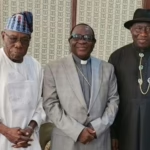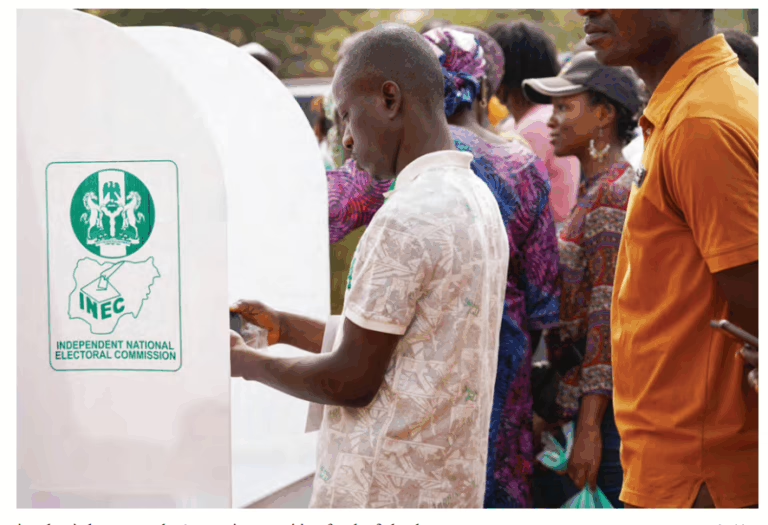Political parties, civil society groups, and leading political analysts have raised alarms over the persistent lack of ideological clarity and the inconsistent execution of party manifestos, warning that these issues continue to hinder effective governance, particularly at the state level.
In discussions with LEADERSHIP Sunday, these experts attributed the current governance challenges to the malfunctioning political party system.
They reflected on the Second Republic era, noting that political parties then were anchored by clear ideologies and well-defined manifestos, which their governments implemented consistently across all levels.
In contrast, today’s political parties are criticized for lacking coherent ideological foundations, with members often displaying indiscipline that undermines manifesto adherence, even in states under their control.
Experts lamented the domination of parties by presidents and governors since Nigeria’s return to democracy in 1999, observing that campaign promises tailored to individual ambitions have replaced genuine party manifestos.
While First Republic parties were largely regional in focus, the Second Republic saw deliberate efforts to establish national parties.
During the 1979-1983 period, Nigeria’s major political parties included the Greater Nigerian People’s Party (GNPP), National Party of Nigeria (NPN), Nigeria Advance Party (NAP), Nigerian People’s Party (NPP), People’s Redemption Party (PRP), and Unity Party of Nigeria (UPN).
Though ideologically distinct, the UPN and PRP stood out for their robust and clear manifestos, with the UPN particularly noted for its consistent manifesto implementation.
The UPN’s manifesto centered on four key pillars: free education from nursery through tertiary levels, free healthcare, integrated rural and community development, and sustainable employment. These policies were faithfully executed in states like Lagos, Oyo, Ogun, Ondo, and Bendel.
In the current political climate, efforts to standardize manifesto implementation remain vague and ineffective, LEADERSHIP Sunday reports.
Past initiatives, such as the Nigeria Governors Forum’s attempt to establish a peer review system among governors, failed to materialize.
Although the ruling All Progressives Congress (APC) and opposition Peoples Democratic Party (PDP) maintain governors’ forums, concerns persist about the inconsistent application of party manifestos and the frequent abandonment of policies by successive administrations within the same party.
This problem is exacerbated by the frequent defection of governors from their parties.
Political Parties Since 1999 Function Primarily as Election Platforms;
ADC Vows to End This Trend
Malam Bolaji Abdullahi, national publicity secretary of the African Democratic Congress (ADC), told LEADERSHIP Sunday that the uneven implementation of party manifestos in states governed by the same party reflects a deeper systemic issue.
He explained that since the Fourth Republic began, political parties have become inherently weak, serving mainly as vehicles for politicians to contest elections rather than as ideological institutions.
“Unlike the Second Republic parties, which were grounded in clear ideologies, policies, and programmes, today’s parties are mere election machines. Their weakness prevents them from enforcing discipline or ideology on individual politicians. Often, politicians secure party tickets and then commission consultants to draft manifestos they rarely engage with themselves,” he said.
“When a party governs six states and each state produces its own manifesto without a unifying ideological framework, it leads to fragmentation and inconsistency.”
Abdullahi recalled that voters in the Second Republic supported parties because they understood what the parties stood for.
“That’s why figures like the late Chinua Achebe aligned with the PRP, which reflected his personal beliefs and values.”
He emphasized the need to rebuild parties grounded in clear policies and manifestos.
“Without that foundation, the current disarray will persist,” he warned.
He also criticized the lack of policy continuity, noting that governors often pursue individual agendas due to the absence of party authority.
“The ADC National Chairman, Senator David Mark, has committed to creating a party where elected officials receive a clear governance blueprint from the outset,” Abdullahi added.
He stressed that parties must develop comprehensive governance plans and societal visions that elected officials are obliged to implement, as was the case with UPN states in the Second Republic.
“Strengthening political parties and preventing domination by powerful individuals is essential. Currently, parties are subservient to politicians rather than the other way around,” he concluded.
IPAC Explains Why Uniform Manifesto Enforcement Fails
The Inter-Party Advisory Council (IPAC) has shed light on the democratic shortcomings related to manifesto enforcement and proposed solutions.
In an exclusive interview with LEADERSHIP Sunday, IPAC national chairman Dr. Yusuf Mamman Dantalle described party manifestos as social contracts between political parties and voters, outlining the policies parties pledge to implement if elected.
“Manifestos are critical electoral tools,” Dantalle said.
However, he noted that turning manifesto promises into tangible governance outcomes is complicated by changing socio-economic realities, differences in state capacities, and diverse local priorities.
“Governance is fluid. Effective leaders balance immediate public needs with long-term development goals,” he explained, citing security challenges and state-specific demands as reasons some governors diverge from party manifestos.
This has resulted in situational leadership, where governors from the same party pursue different priorities-such as education, agriculture, or security-based on local exigencies.
IPAC also condemned the rampant defection of elected officials to rival parties, which undermines manifesto adherence.
“The frequency of defections is alarming,” Dantalle remarked, revealing that IPAC has submitted constitutional amendment proposals to the National Assembly and will advocate for them during the House of Representatives public hearing scheduled for September 22 in Abuja.
The council criticized the absence of internal democracy, the prevalence of godfatherism, and imposed candidacies, contrasting these with the ideology-driven parties of the Second Republic like the UPN, which uniformly implemented policies such as free education.
“The Second Republic was characterized by parties rooted in ideology, discipline, and grassroots funding,” Dantalle observed.
He highlighted that many Second Republic political leaders were independence-era figures such as Dr. Nnamdi Azikiwe, Chief Obafemi Awolowo, and Malam Aminu Kano, who commanded respect and ensured policy consistency.
Today, however, leadership disputes, factionalism, and court interventions have disrupted electoral outcomes, citing the 2019 Zamfara case where internal APC conflicts led to the PDP’s gubernatorial victory.
Such instability weakens party discipline and policy continuity.
To restore order and reinforce party authority, IPAC is engaging political parties and officials, promoting internal democracy, discipline, and funding reforms.
Dantalle advocated for reinstating annual grants to political parties to reduce godfather influence and enhance grassroots accountability.
“Political parties should evolve organically, supported by member contributions as in the Second Republic,” he said.
“IPAC’s current leadership is committed to transforming the political landscape toward a strong, inclusive democracy that fosters sustainable development.”
Ex-IPAC Chairman Ameh: Parties Must Belong to the People, Not Governors
Chief Peter Ameh, national secretary of the Coalition of United Political Parties (CUPP) and former IPAC chairman, told LEADERSHIP Sunday that today’s political parties lack the ideological unity and policy coherence that characterized the Second Republic, especially under the UPN led by Chief Obafemi Awolowo.
Ameh recalled that UPN governors like Adekunle Ajasin, Bisi Onabanjo, Bola Ige, and Lateef Jakande pursued a shared manifesto emphasizing free education, rural development, and social justice, ensuring consistent governance across states.
“There was a collective vision then. Party members paid dues, and the party belonged to the people. Now, corruption has reversed this dynamic-governors own the party, not vice versa,” he said.
He attributed the erosion of internal party democracy and the commercialization of politics to party leadership’s subservience to governors.
“Consequently, governors act independently, ignoring any agreed party manifesto,” he added.
Ameh also highlighted how political defections weaken party discipline and disrupt long-term policy planning.
“Public trust in parties has declined because members neither contribute financially nor participate actively, leaving parties vulnerable to capture by wealthy individuals or officeholders,” he explained.
He contrasted this with the Second Republic, when parties were sustained by ordinary citizens who believed in their vision.
“Today, parties are platforms for power struggles rather than policy implementation,” he lamented.
Ameh further criticized ethnic and regional fragmentation in governance, where governors prioritize local interests over a unified national development agenda, eroding party national identity.
He called for electoral reforms to curb defections and enhance party accountability, emphasizing the need to restore citizen-owned parties, internal democracy, and manifesto-driven governance to rebuild Nigeria’s democratic credibility.
“We must return to fundamentals. Parties should be owned by the people, not controlled by governors. Only then can trust be restored and governance aligned with the people’s will,” he concluded.
Obla: Governance Driven by Personalities, Not Policies
Okoi Obono-Obla, former chairman of the Special Presidential Investigation Panel for the Recovery of Public Property and APC member, told LEADERSHIP Sunday that the absence of uniform party manifestos has severely impacted governance at the state level.
He explained that governors from the same party often pursue divergent policies due to weak ideological foundations, regional politics, and excessive concentration of power.
“Nigerian political parties rarely have clear ideological distinctions, such as conservative versus progressive or socialist versus capitalist,” he said.
“As a result, governance is personality-driven rather than policy-driven. What a state does depends largely on the governor’s preferences, not party principles.”
Obono-Obla pointed out the lack of coordinated development plans across states, making it difficult to measure national or regional progress.
He attributed this to weakened accountability mechanisms, noting that voters cannot hold parties responsible if manifestos are unclear or ignored.
“Instead of asking whether Party A fulfilled its promises, people blame individual governors, which undermines democratic accountability,” he said.
He identified several causes for this fragmentation: lack of internal discipline, ethnic and regional politics, weak institutions, and governors’ overwhelming control of state resources.
“Governors often act as political strongmen, funding party machinery in their states and limiting party control,” he added.
Obono-Obla believes the situation can improve through comprehensive reforms and political will.
He stressed the importance of strengthening internal party democracy, enforcing ideological clarity, and sanctioning members who disregard party development agendas.
He also urged parties to publicize their manifestos and state-specific policy objectives to enhance transparency and accountability.
Political Scientists Highlight Worrying Disconnect Between Politics and Governance
Professor Hassan Saliu, president of the Nigeria Political Science Association (NPSA), expressed concern over the absence of firm ideological commitments in Nigerian politics.
Speaking from Ilorin, he said, “The lack of ideological dedication is a core problem in contemporary Nigerian politics. Unlike earlier times, when political discourse featured ideological diversity, today’s politics lacks meaningful ideological foundations.”
He cited a governor’s infamous dismissal of his party’s manifesto as evidence of the disconnect between political promises and governance.
“Governments across parties now resemble each other, focusing on flashy projects with limited impact on citizens while incurring high costs,” he observed.
Dr. Okeke: Politics Now Centered on Self-Preservation
Dr. Christian Okeke, a political science lecturer at Nnamdi Azikiwe University, Awka, lamented the decline of manifesto-based governance.
“Governance in Nigeria has clearly drifted away from party manifestos,” he said.
“Elected officials ignore party mandates, and parties fail to hold them accountable.”
He described the UPN era as a bygone chapter.
“Today’s politics is marked by prebendalism, patrimonialism, and dysfunction, driven by self-preservation and personal gain,” he added.
He attributed this decline to factors such as politics as a means to escape poverty, lack of accountability, the monetization of elections, and systemic corruption.
CISLAC and Others Call for Urgent Reforms
Suleiman Gimba, senior programme officer at the Civil Society Legislative Advocacy Centre (CISLAC), told LEADERSHIP Sunday that Nigeria’s democracy suffers from a critical deficit: the absence of enforceable, uniform party manifestos.
He lamented that manifestos, once the foundation of governance under parties like the UPN, have become empty campaign slogans with little influence on governance after elections.
“Governors elected on the same platform pursue vastly different agendas-one focuses on infrastructure, another on populist schemes-with no ideological cohesion,” Gimba said.
“Today’s parties function more as election-winning machines than governance institutions.”
He cited the UPN under Chief Obafemi Awolowo as a model of ideology-driven governance, where governors uniformly implemented free education, free healthcare, rural development, and integrated transport.
Gimba noted a troubling trend of executive dominance in Nigerian politics, with power increasingly concentrated in individuals rather than party structures.
“From Obasanjo to Tinubu, there has been a steady personalization of governance,” he said.
He described President Tinubu’s Renewed Hope Agenda as a personal initiative rather than an APC manifesto.
“This shift has weakened political parties, with executives ruling through personal blueprints and sidelining party ideologies,” he concluded.
Ajanaku: Governance Has Become Individualized
Armsfree Ajanaku, executive director of the Grassroots Centre for Rights & Civic Orientation (GRACO), echoed concerns about the erosion of democratic accountability.
“Governance today is individualized, with elected officials abandoning party manifestos in favor of personal agendas,” he said.
Ajanaku called for political programmes to be shaped by grassroots consultations, ensuring manifestos reflect the genuine needs of the people rather than the preferences of candidates.
“In states like Nasarawa or Lagos, priorities such as solid minerals or healthcare may be valid, but were the people involved in these decisions?” he asked.
He emphasized that true democratic participation requires citizens to be engaged in formulating, shaping, and monitoring governance programmes.
Without this, he warned, manifestos will continue to fail as instruments of democratic accountability.
Development practitioner Mohammed Basah observed that governors, though elected on the same party platform, often operate independently, prioritizing personal political interests over shared party goals.
“Governors pursue policies that are at best ad hoc and at worst self-serving,” Basah said.
“Voters are left questioning what the party truly stands for beyond winning elections.”
He contrasted this with the UPN era, when a coherent manifesto guided governance.
“The UPN’s four pillars-free education, free healthcare, integrated rural development, and full employment-were uniformly implemented by all its governors,” he noted.
Irene Awunah-Ikyegh, president of the League of Women Voters of Nigeria (NILOWV), highlighted that the lack of uniform manifestos contributes to inconsistent policy implementation and development outcomes, even among states governed by the same party.
She stressed that manifestos serve as governance roadmaps, outlining a party’s policies, priorities, and vision.
“Without clear, binding manifestos, elected officials often pursue personal or localized agendas rather than a cohesive national or state vision,” she said.
This results in governance driven more by personalities than policies, leading to fragmented development and inconsistent outcomes.
Comrade Okeke Amarachi, executive director of the Women’s Inclusion, Empowerment and Leadership Development Initiative (WIELD-I), noted that parties have largely abandoned their ideological roots, allowing governors to act independently without regard for party principles or development plans.
“Governors elected under the same platform often pursue entirely different policies because party manifestos are weak and unenforced,” she said.
She recalled the Second Republic’s UPN under Chief Obafemi Awolowo, which maintained a unified ideological framework.
“During that era, governors adhered to a single manifesto, ensuring uniform policies like free education across states,” Amarachi explained. “There was ideological discipline and commitment to the party’s collective vision.”






















